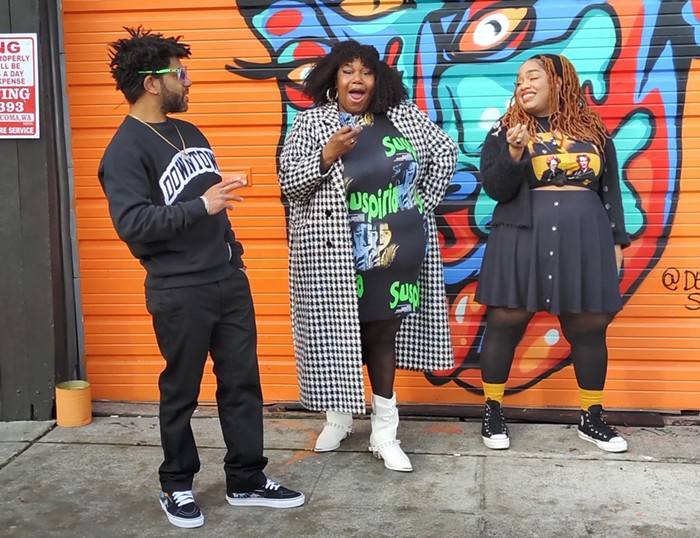Jody Hall does business like a Wild West settler: For two decades, she's been setting up shop not where the customers are but where the customers will be. She worked at Starbucks in the early 1990s, when most Americans couldn't pronounce "latte" and the chain had 30 stores. Then she created Cupcake Royale in 2003, before people could imagine spending $4 on a small cake.
Cupcake Royale now has six locations and sells cakes to Metropolitan Market and Alaska Airlines. You know what happened to Starbucks.
Now she's in the middle of Washington's weed industry, running her own edibles company called Goodship. She's betting that in a market where pot is getting cheaper every month, consumers will pay extra for her made-from-scratch confections.
"I feel like if we do it right, the formula of where I want to go is not all that different from Starbucks," Hall said. "What Starbucks did to the commodity of coffee—creating an elevated brand and a lifestyle around that. There will be really cheap stuff and really good stuff at the end of the day, and the way you do that is to create a meaningful brand that people care deeply about. That's what we did at Starbucks and Cupcake Royale, and that's what I want to do with Goodship."
The success of premium edibles companies like Goodship may rely on the ability to attract an entirely new type of cannabis user into the pot market. Hall is aware that her target market—the same people who have the expendable income to pay $4 for a cupcake and care where that cupcake's flour came from—might not be shopping for pot quite yet.
"I would say that most of the people in Washington State who could consume have yet to go into the stores," Hall said. "They are curious, but it's intimidating in there."
This target market might be an overworked parent in an Eastside suburb, a recent retiree in Ballard, or even a young person who moved to Seattle from a conservative part of the country and is only now starting to move beyond the myths propagated about pot by prohibitionists. What they all have in common is a lack of experience and a general uneasiness with cannabis.
Every aspect of Goodship seems designed to assure these cannabis-wary people that it's okay to eat pot. Hall's products feel more like Martha Stewart offering you an organic pâte de fruit than a Deadhead trying to sell you a bag of gummy bears he just pulled out of his pocket. The edibles are packaged in a cheerful, clean branding scheme that make them look like they could be sold next to a pack of mints at the Nordstrom checkout counter. Goodship's hard candies, called pastilles, contain only 2.5 milligrams of THC each, the smallest dose size I have seen for any edible on the market. When the state-mandated THC serving size for edibles is 10 milligrams (Goodship skirts the law by putting four 2.5 milligram candies in a one-serving bag), these hard candies allow new users to start out with very small doses.
Convincing people to try a new and unusual product was the same thing Hall worked on at Starbucks; she said one of her earliest tasks was creating a phonetic guide to pronouncing the company's drinks. No one knew what a cappuccino or a latte was, let alone how to pronounce them. Starbucks won people over by educating the public about what they were selling but also by creating a socially conscious brand that customers could buy into. Hall is trying to do the same with Goodship.
"We want to build a great brand with a great culture. A company people fall in love with," Hall said.
Goodship advertises their cookies, chocolates, and candies as made from scratch with locally sourced, sustainably grown flour and organic chocolate. They are trying to creating some cultural capital in Seattle, with a quarterly lecture series (that The Stranger is a sponsor of) designed to show how weed can bring people together to share ideas in a new way, and events like a recent Sufjan Stevens listening party at the Pacific Science Center.
Hall seems to personally embody some of the dichotomy of the corporate and the countercultural. On a recent visit to her headquarters, she was dressed in rolled-up jeans with ripped knees and a blue knit beanie while she peppered discussions with talk of budgetary line items and specifics of the federal tax code. She's a weed dealer who has sold more than $360,000 in pot edibles but insists on saying "boarding the Goodship," her branded corporate lingo for getting high.
Hall, who is married with two young children, said being gay hasn't been much of a factor in the legal weed industry.
"Pot is hard and fun and exhilarating and draining and grinding... and I think that's almost every human's experience in this industry, gay or not," Hall said.
When you're talking about the pot business, nothing is for sure, but Hall said the company is already laying the groundwork to expand to Nevada and other states with legal pot.

















